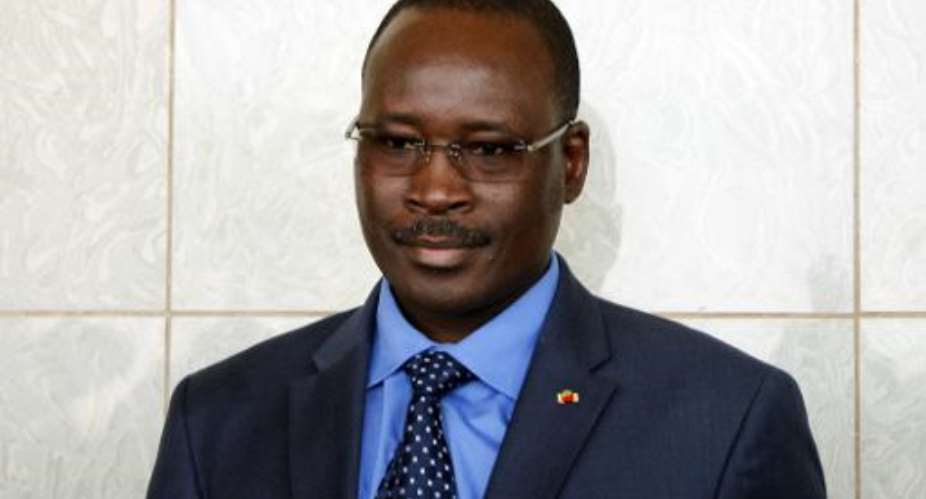Ouagadougou (AFP) - Burkina Faso's military ruler turned prime minister pledged to carry out reforms on Monday as an interim government formed in the wake of president Blaise Compaore's fall met for the first time.
Lieutenant Colonel Isaac Zida, who took power amid a popular uprising late last month and who has since been named prime minister in the interim government, said reforms would include tackling corruption.
"We are going to focus on reforms in the defence, justice and economic sectors," said Zida, who will also take the role of interim defence minister.
"There has been so much corruption in this country," he added.
Zida notably wore civilian clothes to the cabinet meeting -- a blue suit -- marking a change from previous weeks, when the former number two of the presidential guard was always seen in his red beret and military uniform.
The three other soldiers in the cabinet also wore civilian clothes.
The 26 ministers gathered for about an hour in the presidential palace after they were named late Sunday following several days of intense negotiations over the composition of the government.
The interim government is to return the landlocked country of nearly 17 million to civilian rule, with elections to be held in November 2015.
Burkina Faso's military seized power on October 31 after Compaore was ousted in a popular revolt sparked by his bid to extend his 27-year hold on power.
Besides defence and the prime minister's office, the military will have control of the interior ministry as well as mines, key to the nation's economy.
Interim civilian president Michel Kafando will double up as foreign minister.
Interior Minister Colonel Auguste Denise Barry announced the lifting of a curfew in place since October 30.
Under intense international pressure, and the threat of sanctions if the military retained the post of head of state, an agreement was thrashed out to work towards elections in November 2015.
Protest leaders and civil society representatives will be watching the new government's performance closely, and certain moves have already drawn suspicion.
- Betrayal of 'revolution'? -
Zida's appointment as prime minister provoked anger among residents of the capital Ouagadougou who saw it as a betrayal of their "revolution."
The lieutenant colonel however signalled that the former regime would not be spared as the interim government sought to move the west African nation forward.
"The most urgent matter is to resolve cases pending in court," Zida said. Interim president Kafando vowed last week to punish those responsible for excesses during Compaore's rule.
The appointment of the culture minister, Adama Sagnon, has also sparked criticism. Sagnon was a prosecutor involved in the case of the murder of journalist Norbert Zongo in 1998.
Zongo had looked into the murder of the driver of Francois Compaore, the ex-president's brother. Charges against Francois Compaore were later dropped.
There were protests outside the culture ministry on Monday over Sagnon's nomination, but the newly named minister defended his role in the case.
"The prosecutor does not make a decision, only petitions," said Sagnon, a longtime friend of Zida's. "I have nothing to feel guilty about."
Souleymane Ouedraogo, part of the Balai Citoyen (Citizen Sweep) protest group that played a role in Compaore's fall, said protests over Sagnon could continue.
However, he said that "it is a good government, with one or two exceptions," adding he was satisfied with the balance between soldiers and civilians.
"Given what has happened recently, it would be difficult for the army to step aside from public affairs and let civilians run defence and security," he said.





 Akufo-Addo spotted ordering chiefs to stand for his handshake
Akufo-Addo spotted ordering chiefs to stand for his handshake
 Akufo-Addo ‘disrespects’ every chief in Ghana except Okyenhene — NDC Communicato...
Akufo-Addo ‘disrespects’ every chief in Ghana except Okyenhene — NDC Communicato...
 Supreme Court clears way for dual citizens to hold key public positions
Supreme Court clears way for dual citizens to hold key public positions
 Be transparent, don’t suppress the truth – Prof. Opoku-Agyemang to Jean Mensa
Be transparent, don’t suppress the truth – Prof. Opoku-Agyemang to Jean Mensa
 ‘I won’t tell the world I was only a driver’s mate during challenges’ – Prof Jan...
‘I won’t tell the world I was only a driver’s mate during challenges’ – Prof Jan...
 We’ll prosecute corrupt officials of Akufo-Addo’s govt – Prof Jane Naana
We’ll prosecute corrupt officials of Akufo-Addo’s govt – Prof Jane Naana
 [Full text] Acceptance speech by Prof Jane Naana Opoku-Agyemang as 2024 NDC Runn...
[Full text] Acceptance speech by Prof Jane Naana Opoku-Agyemang as 2024 NDC Runn...
 Election 2024: Don’t be complacent, we haven’t won yet – Asiedu Nketia cautions ...
Election 2024: Don’t be complacent, we haven’t won yet – Asiedu Nketia cautions ...
 Election 2024: Stop fighting over positions in Mahama’s next govt – Asiedu Nketi...
Election 2024: Stop fighting over positions in Mahama’s next govt – Asiedu Nketi...
 Prof Jane Naana Opoku-Agyemang will restore dignity of vice presidency – Fifi Kw...
Prof Jane Naana Opoku-Agyemang will restore dignity of vice presidency – Fifi Kw...
